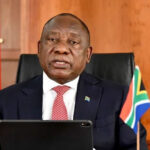Johannesburg, South Africa – The unfolding drama surrounding the ANC and DA's negotiations for positions in President Cyril Ramaphosa's cabinet continues to captivate political observers and citizens alike. A leaked offer letter from ANC secretary-general Fikile Mbalula to DA leader John Steenhuisen has shed light on the DA's request for 12 posts in the government of national unity (GNU). The letter, dated June 22, reveals that the ANC has offered six ministerial posts and seven deputy ministries to their coalition partner, sparking further debate on power-sharing and proportional representation.
Mbalula's letter emphasized the importance of filling critical leadership positions in parliament, including roles in the National Council of Provinces (NCOP), which the DA should consider as part of their cooperation within the GNU. The ANC's proposal seeks to reflect a shared understanding regarding the president's prerogative to appoint members of the national executive in accordance with the constitution.
The crux of the matter lies in the divergent positions on how parties should be represented in the cabinet. The deadlock arose from the issue of proportional allocation of positions, which led to the referral of the matter to party leaders for resolution. The ANC's interpretation is based on the electoral mandate received by parties, reflected in the number of seats held in the National Assembly. They argue that parties participating in the GNU are accountable to the entire electorate and, therefore, all members of the National Assembly.
The leaked response from DA federal chair Helen Zille has caused a stir in the media. Zille emphasized the need to share power in the new government, acknowledging that it cannot continue to reside solely with the ANC. She stated that the DA's proposal to Ramaphosa outlines a clear, reasonable, and fair way to operationalize clause 16 of the agreement, which aims to respect the will of the people expressed in the elections while promoting inclusivity in the national interest.
Zille highlighted that the distribution of positions in the cabinet should consider the relative electoral size of the parties involved. She argued that governments are composed of parties participating in the government, not those in opposition, which is the role of parliament. Zille proposed a process of "proportionate dilution," where both the ANC and DA sacrifice posts proportionally to achieve inclusivity.
Furthermore, the DA demanded representation across all cabinet clusters and insisted on the inclusion of the post of deputy president, following standard practice in similar governments worldwide. However, they were willing to give up the deputy president post if it were replaced with both a minister in the presidency, designated as the leader of government business, and a deputy minister of finance actively involved in budget development.
The ongoing negotiations between the ANC and DA highlight the complex dynamics of power-sharing and proportional representation in the GNU. As the two largest parties, their ability to find common ground while respecting the electoral mandate and promoting inclusivity will shape the future of South Africa's government.
Political analysts await further developments, closely watching how the ANC and DA navigate these delicate negotiations. The outcome will not only determine the composition of the cabinet but also set a precedent for future coalition governments in South Africa.










